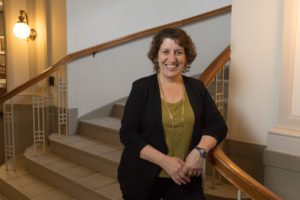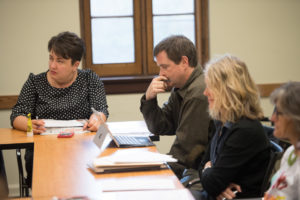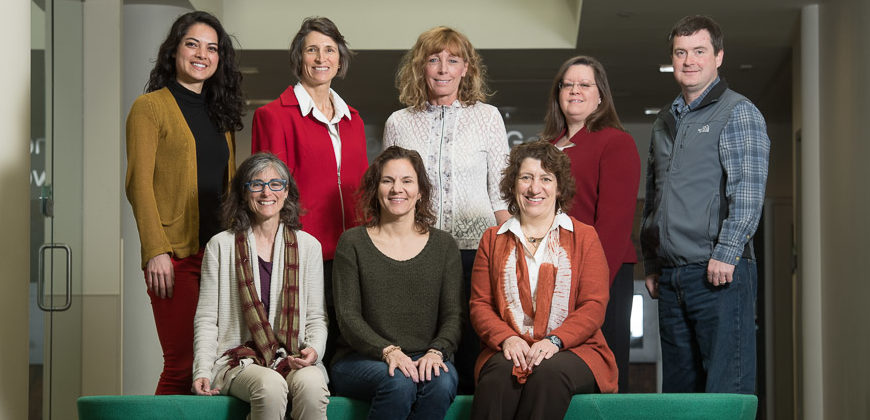It can seem a pretty daunting challenge when you serve on a committee charged with bringing about major institutional change, overcoming obstacles and structural constraints shaped by history and human nature over 150 years.
But the Standing Committee on the Status of Women Faculty has moved swiftly, boldly and with determination to forge a better future for Colorado State University despite its relative newness in the institution’s long life. President Tony Frank established the committee in May 2014, making the announcement in a message to campus titled Shifting our Trajectory, acknowledging the need to change the climate for women at CSU.
Read more: Shifting our Trajectory, May 7, 2014
“If we really want to dispel the persistent, pervasive disadvantages that impact our women faculty on a daily basis, if we want to see change that doesn’t take generations to materialize, if we want to improve the climate for all women and men at CSU, then we need to address this as a University in more concrete ways than we have to date.” – Colorado State University President Tony Frank
Frank charged the standing committee with designing strategies and promoting activities that would enhance gender equity and the status of women faculty at CSU. To achieve these goals, he positioned them as a special subcommittee under the Commission on Women and Gender Equity, formed in 1997 by then-President Al Yates to serve all employees and students. That gave the SCSWF an unprecedented opportunity to influence a reformation of the cultural landscape for current and future generations of faculty.
“On the upside, we have the administration’s ear and boots on the ground, and they’ve shown us a genuine commitment to make change,” said Ellen Fisher, SCSWF chair, senior faculty advisor to the Office of the Vice President for Research, and professor of chemistry. “But if we want to make good on President Frank’s promise to make CSU the best place for women to work and learn, we have to address some of the most systemic issues that hold us back – from implicit bias to that which is hidden in the language of department codes.”

New leadership
Fisher was appointed the new chair of the standing committee following the retirement of Irene Vernon in December. Vernon, former chair of the Department of Ethnic Studies and now professor emeritus, said her tenure as SCSWF chair in its first 2 ½ years was one of the highlights of her 22-year career at CSU.
“Many of the standing committee members are senior female faculty who have their own stories of navigating gender bias and roadblocks,” said Vernon. “They’ve experienced the challenges firsthand and care deeply, personally about the cause. It means something to them in their lives, and their work means so much in the lives of others.”
Read more: Irene Vernon leaving a lasting legacy for women, ethnic studies
When Irene Vernon was a baby, her mother looked out the kitchen window at her husband and sons working in the field and said to herself that she didn’t want her family to spend the rest of their lives doing that.
Vernon said as a university, CSU is ahead of the game because it has seen the problems and is addressing them. But there’s much left to do.
“Culture shift is so complex with so many moving parts and pieces,” said Vernon. “Culture is big, but it can change and that’s what this committee is working on.”
Fisher said the committee is already effecting change, and her goal is to keep its momentum moving forward.
“When I think about what the committee needs right now in terms of leadership, it’s someone who is going to be able to make the same kind of progress Irene was able to make by relationship management with administration and listening to faculty,” said Fisher.
Commitment to serve
Committee members have been called trailblazers, but quickly point out forging a new future requires a willingness to work hard. As a result, it operates with strong expectations for its 18 members. They must embrace the concept of transformative service and a have a healthy respect for the committee’s division of labor. Everyone is expected to come ready not just to brainstorm or walk through agenda items, but to roll up their sleeves and make change happen.
The full group meets twice monthly for 90 minutes, and assigns prioritized projects and initiatives across several subcommittees. Members focus explicitly on issues impacting work life, campus climate, and other persistent barriers inhibiting success for women faculty, including:
• Development of a new faculty ombuds position
• A comprehensive study of the campus climate for women faculty at CSU
SCSWF Forum: Female Faculty’s Experiences and Perceptions of the Culture and Climate at CSU
When: Monday, March 20, 3-5 p.m. (reception to follow)
Where: Lory Student Center, Ballroom A
The SCSWF conducted a comprehensive research study over the last year to capture women faculty’s experiences and perceptions of the culture and climate at CSU. The study was led by external consultant Dr. Nadya Fouad from the University of Wisconsin-Milwaukee in collaboration with a group of CSU faculty. The study offers an in-depth and nuanced understanding of women faculty’s experiences and perceptions within the context of CSU’s history, policies, and procedures. The study findings will be presented at this forum, which is open to the campus community.

Functioning like an ‘executive team’
CWGE chair Sue James says the standing committee is unique in its agility, aided by what they bring to the table, the quality of their collaboration and the backing they receive.
“They function like an executive team, because of their level of expertise, experiences and dedication,” said James, head of the Department of Mechanical Engineering. “And it’s very important that the standing committee is under the commission because it puts their power under the president and provost’s offices, which is how they’ve been able to make so much impact in a short period of time. So, you combine the power of people who have been at the university a long time with the power of the administration and you get great, meaningful progress.”
For many on the standing committee, that meaningful progress is a validation that they have not been alone in their individual struggles around gender equity. Committee member Roe Bubar says knowing they are working with colleagues who have faced similar problems has created a synergy that has elevated the committee into its own sphere.
“The push to form the standing committee came directly from senior women stepping forward in large numbers to discuss their concerns with CSU leadership,” said Bubar, a professor with a joint appointment in ethnic studies and the School of Social Work. “It catalyzed a level of motivation that was collective and empowering, and resulted for the first time in an all-woman faculty initiative outside Women’s Studies that was moving an agenda forward.”

Spin-off effect
The committee says there is a spin-off effect to what they do and it sparks action elsewhere. For example, both women and men have benefited from the push for better faculty parental leave. And three graduate students led their own charge to have the university adopt a parental leave policy for graduate assistants. That plan became effective last fall.
Paul Doherty, one of two men currently on the standing committee, says that although he hasn’t shared the same experiences around gender issues as many of his female colleagues, he is proud to be in the trenches with them, charged to bring change.
“So many committees you are on, people are getting stuff done, but this one has a different feel,” said Doherty, professor in the Department of Fish, Wildlife and Conservation Biology. “When you work with a group that’s really passionate and energized, a group of smart, high-voltage people committed to improving CSU, that’s powerful.”
Fisher agrees and says it’s been an amazing experience.
“Anything we can do to create an environment where we value difference and diversity, different ways of knowing and thinking, that’s what makes an institution like ours strong and resilient,” said Fisher. “Although overwhelming at times, it’s also been rewarding and I’m honored to work with a brilliant group of women and men who are committed to making CSU better for everyone.”
